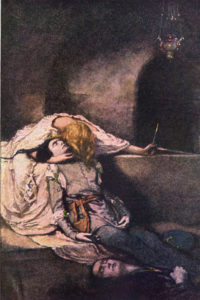http://www.theplainjane.com/peep_plays/rj_scene01.html Yeah, that’s pretty much what I said. Romeo and Juliet, enacted by Peeps, the marshmallow Easter candy. Warning, lots of bad words and peep sex.
Category: Shakespeare Plays
William Shakespeare is widely regarded as one of the most influential playwrights in history, and his plays have been performed and studied for centuries. From the timeless tragedy of Romeo and Juliet to the hilarious antics of A Midsummer Night’s Dream, Shakespeare’s plays continue to captivate audiences around the world. Whether you’re a fan of tragedy, comedy, or romance, there’s a Shakespeare play for everyone. So why not revisit these timeless classics and discover the magic of Shakespeare for yourself?
Browse the entire text of Shakespeare’s plays right here on Shakespeare Geek.
Romeo’s Last Words

Looking for the answer to a crossword puzzle clue, “Romeo’s last words”? Look no further. Shakespeare Geek’s got the answer.
Originally I posted this content in relation to the finale of the musical HAIR, where it’s sung as background harmony. It became a massive hit for me once Google spotted it because “Romeo’s last words” frequently comes up as a crossword puzzle clue. Without further ado:
Eyes, look your last!
Romeo and Juliet, Act 5 Scene 3
Arms, take your last embrace! and, lips, O you
The doors of breath, seal with a righteous kiss
A dateless bargain to engrossing death!
Come, bitter conduct, come, unsavoury guide!
Thou desperate pilot, now at once run on
The dashing rocks thy sea-sick weary bark!
Here’s to my love! (drinks)
O true apothecary!
They drugs are quick. Thus with a kiss I die.
If you’re here for the crossword puzzle clue, it’s “I die”.
Beyond the Crossword: The Tragic Love Story of Romeo and Juliet
While the crossword puzzle answer may provide a brief moment of triumph, it’s essential not to overlook the deeper significance of Romeo’s last words within the larger context of the play. Romeo and Juliet‘s story is a timeless tale of forbidden love, feuding families, and unfolding tragic consequences. Romeo’s final words symbolize the culmination of their ill-fated romance, reflecting the intensity of their love and the devastating loss they both endure.
What was that about HAIR?
HAIR, the iconic rock musical of the 1960s, is a vibrant celebration of youth, freedom, and counterculture. The show, set against the backdrop of the Vietnam War era, explores themes of love, peace, and societal rebellion. In its powerful finale number, the musical brings together the exhilarating energy of the cast with a clever twist. The lyrics ingeniously incorporate quotes from Shakespeare’s Romeo and Juliet, infusing the modern narrative with timeless words. This blending of classic and contemporary elements adds depth and resonance, reminding us of the enduring relevance of love, sacrifice, and the pursuit of a better world.
Conclusion
So, if you’ve been seeking the answer to “Romeo’s Last Words” for your crossword puzzle, you now have the perfect clue to complete the grid. Remember, beyond its puzzle-solving value, Romeo’s final words hold immense emotional weight, representing the tragic ending of a legendary love story.
Happy Anniversary, Romeo and Juliet?
According to many “this day in history” sites March 11, 1302 is Romeo and Juliet’s wedding anniversary.
It’s not. In the opening scenes Lady Capulet tells us that it is “a fortnight and odd days until Lammas-tide”, which puts the play’s timeline in July.
Skeletal Romeo and Juliet
5000 years ago makes it a little too early, and they never did make it to Mantua, but this article about two skeletons found locked in an embrace is loaded with enough Romeo and Juliet references to make it worth a link. An outstanding archaeological find, to be sure, though the whole “wife was probably sacrificed to keep the dead husband company” thing kinda puts a morbid spin on the romantic aspect.
Romeo killed…Benvolio?
I’ve mentioned before that a friend of mine teaches Romeo and Juliet. We had dinner this weekend, and I asked her how the class was going. “Well,” she said, “I never knew that Romeo killed Benvolio. I saw that on a test I was grading today.”I didn’t pester her all through dinner since I know she doesn’t love to talk about Shakespeare all night. But it’s got me wondering. I wasn’t there. I don’t know what leads up to such an answer. But why would a student give that answer? I figure it’s pretty unlikely that they’ve misunderstood the story so much that they think that Benvolio was killed by Romeo. More than likely they know that Romeo killed somebody (that’s probably how the question was asked, who does Romeo kill in Act III), and they blanked on the name. They then think of all the names they can remember and pick one that sounds right. That’s not necessarily a problem of understanding, that’s a problem of recall. The name Tybalt doesn’t stick in the head the same way that Romeo/Benvolio/Mercutio do. Those three also seem to come as a set, their names all sound similar. But Tybalt’s out in the cold, you have nothing to anchor him to. I suppose his name sounds a little like Juliet, or Capulet (that trailing T), but obviously not enough.But how do you fix that? Say that you’re about to teach the class, and you know that at the end of class you’re in danger of getting answers like Romeo killed Benvolio. What do you emphasize while teaching the story to prevent such mistakes from occuring?
